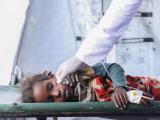Feb 6, 2002 (CIDRAP News) The proposed 2003 budget for the US Department of Health and Human Services (HHS) features a 45% increase in spending for bioterrorism preparedness, with research at the National Institutes of Health (NIH) accounting for much of the increase.
"Our budget for the next fiscal year includes $4.3 billion for bioterrorism preparedness, an increase of $1.3 billion, or 45 percent, above FY 2002," HHS Secretary Tommy G. Thompson said in presenting the budget this week. "The NIH will get $1.7 billion for new vaccines and diagnostics as well as strengthening the security of its facilities."
Under the proposal, the NIH would get $977 million for bioterrorism research, up from $183 million provided this year, according to a bioterrorism budget overview provided by Thompson's office. In addition, the NIH would receive $521 million for physical security and facilities, up from $92 million this year, and $250 million to procure anthrax vaccine, for which no money is earmarked this year. Total NIH spending on bioterrorism preparedness would be $1.748 billion, as compared with $274 million this year.
In contrast, the Centers for Disease Control and Prevention (CDC) would spend about 29% less on bioterrorism preparedness next year than this year, according to the HHS figures. The decrease is largely explained by this year's large outlays for the National Pharmaceutical Stockpile.
Total CDC spending related to bioterrorism in fiscal 2002 is set at $2.298 billion, including $512 million for smallpox vaccine and $645 million for stockpiling of other drugs and vaccines, the HHS figures show. For 2003, the proposed total is $1.637 billion, a $661 million decrease, with $100 million going for smallpox vaccine and $300 million for other stockpile items. CDC funding to improve state and local preparedness would stay the same in 2003 at $940 million. However, funds for security and facilities would increase from $46 million this year to $120 million in 2003. The CDC would also get a $28 million increase, to $144 million, for "upgrading capacity."
Another boost for bioterrorism preparedness would come in the form of $518 million for hospitals, a 284% increase from the $135 million being provided this year, HHS officials said. That allocation is coupled with $60 million for training, $19 million for emergency services for children, and $21 million for poison control centers. These allotments would all be administered by the Health Resources and Services Administration (HRSA).
"The funding would help build an effective nationwide network prepared to respond to large-scale casualties, as well as helping to provide specific materials to be immediately available in hospitals, and helping to support new clinical personnel," HHS said in a statement issued yesterday. The funds would be used to:
- Expand the capacity of hospitals and outpatient facilities to deal with mass casualties
- Improve hospitals' capability to control infection and treat people at risk for communicable diseases
- Train healthcare personnel to recognize rare diseases and treat patients who have been exposed to toxins
- Make infrastructure improvements, including "infectious disease containment systems"
At the Food and Drug Administration (FDA), bioterrorism-related spending would increase by only $1.2 million, to $159 million, in 2003, HHS figures show. This would include $98 million for food safety, the same as this year; $54 million for reviewing vaccines, drugs, and diagnostics, up from $47 million; and $7 million for physical security, down from $13 million. The FDA's mission includes protecting regulated products from deliberate contamination and making sure that medical supplies are available for preventing and treating injuries caused by biological, chemical, and nuclear agents, the agency noted.
At the NIH, the accelerated bioterrorism research will focus on the pathogens the CDC has listed as the likeliest candidates for use in biological attacks, according to an agency briefing paper. NIH plans call for four "broad, interconnected" efforts:
- Basic research on the physiology and genetics of potential bioterrorism agents, on immune system function and response to each agent, and on the pathogenesis of diseases
- Discovery and development of new vaccines, therapeutic agents, and diagnostic tests
- Clinical research to test new products for safety and effectiveness
- Infrastructure improvements to facilitate research
The administration is proposing to increase the overall NIH budget by 15.7%, to $27.3 billion, which is double the 1998 level, the briefing paper says.
See also:
Budget presentation statement by HHS Secretary Thompson
http://archive.hhs.gov/news/press/2002pres/20020204b.html
HHS press release on bioterrorism preparedness funding for hospitals
http://archive.hhs.gov/news/press/2002pres/20020205b.html


















